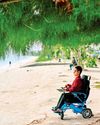
In an interview with THE WEEK, Yuri Deigin, cofounder of the independent group DRASTIC investigating the origins of the pandemic, says a lab in Wuhan in early 2020 developed another virus, potentially a much more dangerous one. He also talks about the progress the group has made and why he is not optimistic about China revealing information. A full-time drug developer in Canada, Deigin is currently working on therapies to slow the onset of Alzheimer’s and on its eventual reversal. Excerpts:
Q/ It has been more than three years since the coronavirus first emerged in Wuhan. Yet, there has been no headway; the investigations into its origins have been halted.
A/ People who hold the information are happy with the status quo and China is not going to release any new information that could help us investigate the lab [in Wuhan]. They are insistent that the lab had nothing to do with it, but at the same time they are non-transparent about sharing any information about the lab.
In the US, things have shifted slowly. The Republicans got control [of the House of Representatives] and are starting to look into the American side of things like [the NGO] EcoHealth and all the NIH-funded research that was being done in Wuhan. The problem is that, in the US, it is still not mandatory to answer the questions the likes of Senator Paul are raising, and to share the data the Republican investigators are requesting.
هذه القصة مأخوذة من طبعة March 12, 2023 من THE WEEK India.
ابدأ النسخة التجريبية المجانية من Magzter GOLD لمدة 7 أيام للوصول إلى آلاف القصص المتميزة المنسقة وأكثر من 9,000 مجلة وصحيفة.
بالفعل مشترك ? تسجيل الدخول
هذه القصة مأخوذة من طبعة March 12, 2023 من THE WEEK India.
ابدأ النسخة التجريبية المجانية من Magzter GOLD لمدة 7 أيام للوصول إلى آلاف القصص المتميزة المنسقة وأكثر من 9,000 مجلة وصحيفة.
بالفعل مشترك? تسجيل الدخول

Walking in pine forest can have the same effect as a prescription drug
INTERVIEW - KATHY WILLIS, professor of biodiversity, the University of Oxford, and author, Good Nature

MORE THAN A HELPING HAND
Maria Victoria Juan spent a lifetime healing wounded soldiers, and she can't think of anything she could have done better

Against all odds
Mohamed Raishan Ahmed was born with spinal muscular atrophy, which made him unable to sit, stand or walk. Recently, the Maldivian underwent a rare, complex surgery in India that now allows him to sit upright. At 23, the fact that he is alive is in itself an achievement. But he has gone beyond mere survival-with a pursuit of excellence

A pacemaker tale
From science fiction to reality, with a touch of southern Indian wisdom

Driving safe
Taxi drivers endure gruelling hours, cramped seats and relentless traffic, making them prime candidates for health issues like back pain, hypertension, diabetes and insomnia.

Good food, good life
From the moment of birth, we establish a relationship with food—a nourishing link that requires care and attention to stay healthy

POOR SLEEP IN MIDLIFE COULD AGE YOUR BRAIN FASTER
PEOPLE WHO EXPERIENCE SLEEP ISSUES, such as difficulty falling asleep or staying asleep in their 40s, may show more signs of brain ageing in late midlife. Poor sleep may accelerate brain atrophy that is associated with dementia.

BRAIN SCANS SHOW MINDFULNESS MEDITATION CAN REDUCE PAIN
CAN MINDFULNESS MEDITATION actually relieve pain, or is it just a placebo effect?

NON-SURGICAL OPTION TO EASE KNEE ARTHRITIS
A NEW, MINIMALLY INVASIVE procedure called genicular artery embolisation (GAE) can effectively reduce pain, improve quality of life and reduce progression of the disease and the need for knee replacement surgery in people with knee osteoarthritis.

EARLY ONSET DIABETES, BELLY FAT LINKED TO DEMENTIA
FACTORS SUCH AS DIABETES and belly fat in midlife can put you at risk of dementia and Alzheimer's disease later in life.